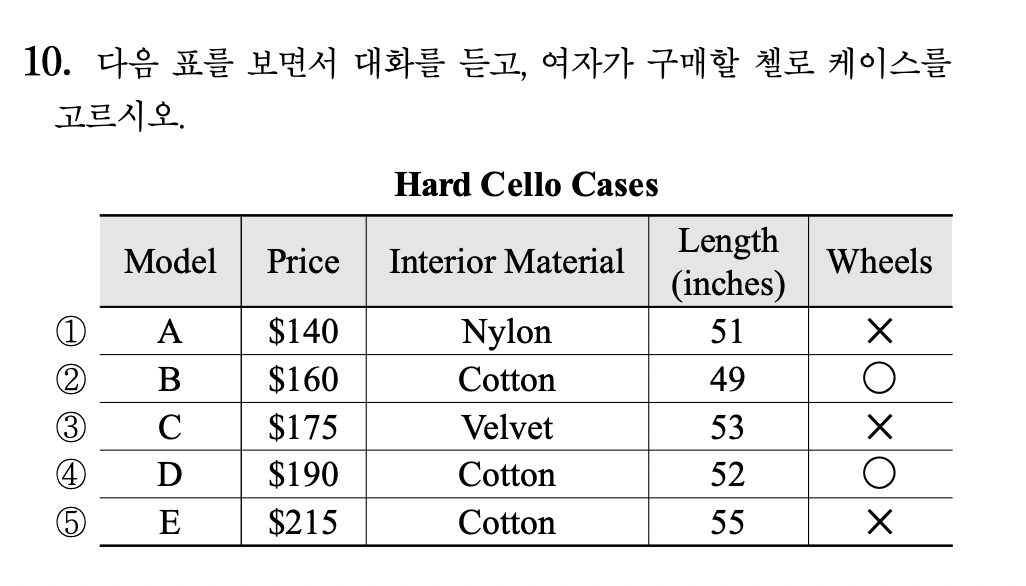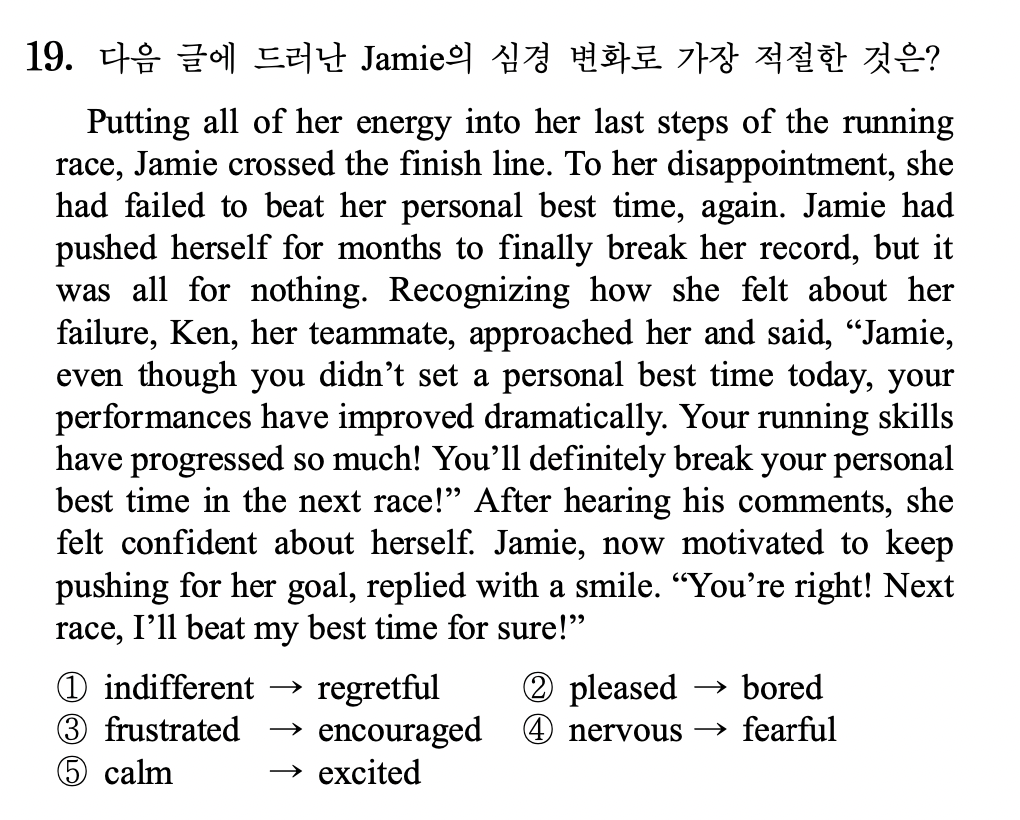Today (Nov 2022) was Suneung Day again in South Korea for the 2023학년도 test. All final year high school students (and many older students who are trying to re-take the test for a better score) took the test today that will determine a large part of their future lives: the Korean College Scholastic Aptitude Test (대학수학능력시험, daehak suhak neungryeok sihum), or just CSAT or 수능 (suneung) for short.
As usual, hours (perhaps minutes) after the completion of the test, the test papers and their answers were released for students to check and agonize over. As I've done in the past, I thought I'd go through and pick out a selection of questions from this year's test for your perusal and enjoyment. Are you smart enough to pass the Korean version of the SAT? Probably not, to be honest. But fun to try.
I've chosen a selection of questions to demonstrate some of the types of questions that are on the test. Though I've stuck with only the English section. The full question sheet and full answer sheets, for the full range of test subjects are made available here in direct links to PDFs inside ZIP files. Not all students take each. All students take Korean, math, English, and (now) Korean history. You then choose between social studies and science. Math-focused students take additional specialized math portions, and those who choose can take secondary subjects (like a second foreign language other than English).
2023 Entrance-Year Suneung Exam papers (Zipped PDFs)
- Korean language subject (국어)
- Math (수학)
- English - Listening portion / Reading portion (영어, 듣기평가)
- Korean history (한국사)
- Social studies (사회탐구)
- Science (과학탐구)
- Job skills (직업탐구)
- Second foreign language / Chinese hanja (제2외국어/ 한문)
Any you don't see listed here, just Naver search 23수능 and you'll get them in a onebox result.
Remember that although this was the 2022 test, it is identified as the 2023 test (2023학년도 대학수학능력시험) because it applies to students entering university in 2023.
Here we go! I'll put the answers at the bottom.
Sample actual questions from 2023 Suneung English section
Listening portion
Selected questions from the listening portion. Students should look at the question and hear the associated dialog then choose the correct answer based on what they hear.
Question 4
Listening to the dialog and choose the part of the picture that does NOT match the dialog.
4. 대화를 듣고, 그림에서 대화의 내용과 일치하지 않는 것을 고르시오.
M: Hi, Jane. What are you looking at on your phone?
W: Hi, Brian. It’s a picture I took at Grand Boulder National Park. I went hiking there last weekend.
M: Let me see. I like the bear statue wearing the check pattern jacket.
W: It’s cute, right?
M: Yeah. There’s a park map between the lights. It seems to include useful information.
W: It helps me pick a different trail each time I go hiking. Do you see the two flowerpots in front of the cabin?
M: Yes. They look beautiful. Oh, there’s a round table by the path.
W: I had lunch there.
M: What a nice place to enjoy lunch! Look at the bird on the tree branch. W: Isn’t it lovely? I love going there and being close to nature.
Question 10
Look at the table, then listen to the dialog and choose which cello case the woman will purchase.
10. 다음 표를 보면서 대화를 듣고, 여자가 구매할 첼로 케이스를 고르시오.
M: Welcome to Uptown Music Shop. How can I help you?
W: Hi, I’m looking for a hard cello case.
M: All right. Here’s our catalog. These are the ones we have in stock. How
much are you willing to spend?
W: I can spend up to $200.
M: Okay. How about the interior material? Do you have a preference? W: Well, I don’t want the velvet one. It seems difficult to take care of. M: Right. Then how about the length?
W: I have a full-size cello, so I want a case that’s at least 50 inches long. M: Now you have two options left. Do you need wheels on your case? W: No, I don’t need them. I won’t carry it around a lot.
M: Then this is the one for you.
W: Thank you. I’ll take it.
Reading portion
Question 19
Read the following about Jamie and choose which answer correctly shows how Jamie's mood changed.
19. 다음 글에 드러난 Jamie의 심경 변화로 가장 적절한 것은?
Putting all of her energy into her last steps of the running race, Jamie crossed the finish line. To her disappointment, she had failed to beat her personal best time, again. Jamie had pushed herself for months to finally break her record, but it was all for nothing. Recognizing how she felt about her failure, Ken, her teammate, approached her and said, “Jamie, even though you didn’t set a personal best time today, your performances have improved dramatically. Your running skills have progressed so much! You’ll definitely break your personal best time in the next race!” After hearing his comments, she felt confident about herself. Jamie, now motivated to keep pushing for her goal, replied with a smile. “You’re right! Next race, I’ll beat my best time for sure!”
1. indifferent → regretful
2. pleased → bored
3. frustrated → encouraged
4. nervous → fearful
5. calm → excited
Question 21
What does the phrase "make oneself public to oneself" most closely match in meaning in the following passage?
21. 밑줄 친 make oneself public to oneself 가 다음 글에서 의미 하는 바로 가장 적절한 것은? [3점]
Coming of age in the 18th and 19th centuries, the personal diary became a centerpiece in the construction of a modern subjectivity, at the heart of which is the application of reason and critique to the understanding of world and self, which allowed the creation of a new kind of knowledge. Diaries were central media through which enlightened and free subjects could be constructed. They provided a space where one could write daily about her whereabouts, feelings, and thoughts. Over time and with rereading, disparate entries, events, and happenstances could be rendered into insights and narratives about the self, and allowed for the formation of subjectivity. It is in that context that the idea of “the self [as] both made and explored with words” emerges. Diaries were personal and private; one would write for oneself, or, in Habermas’s formulation, one would make oneself public to oneself. By making the self public in a private sphere, the self also became an object for self-inspection and self-critique.
1. use writing as a means of reflecting on oneself
2. build one’s identity by reading others’ diaries
3. exchange feedback in the process of writing
4. create an alternate ego to present to others
5. develop topics for writing about selfhood
Question 25
Look at the graph and read the passage. Choose the part of the passage that is wrong according to the graph.
25. 다음 도표의 내용과 일치하지 않는 것은?
The above graph shows the percentages of Americans’ preferred type of place to live by age group, based on a 2020 survey. [1] In each of the three age groups, Town/Rural Area was the most preferred type of place to live. [2] In the 18-34 year-olds group, the percentage of those who prefer red Big/Small City was higher than that of those who preferred Suburb of Big/Small City. [3] In the 35-54 year-olds group, the percentage of those who preferred Suburb of Big/Small City exceeded that of those who preferred Big/Small City. [4] In the 55 year-olds and older group, the percentage of those who chose Big/Small City among the three preferred types of place to live was the lowest. [5] Each percentage of the three preferred types of place to live was higher than 20% across the three age groups.
Question 34
Which answer best fills in the blank in the passage?
Note: this question was apparently one of the most difficult on this year's test.
34. We understand that the segregation of our consciousness into present, past, and future is both a fiction and an oddly self-referential framework; your present was part of your mother’s future, and your children’s past will be in part your present. Nothing is generally wrong with structuring our consciousness of time in this conventional manner, and it often works well enough. In the case of climate change, however, the sharp division of time into past, present, and future has been desperately misleading and has, most importantly, hidden from view the extent of the responsibility of those of us alive now. The narrowing of our consciousness of time smooths the way to divorcing ourselves from responsibility for developments in the past and the future with which our lives are in fact deeply intertwined. In the climate case, it is not that _____________________. It is that the realities are obscured from view by the partitioning of time, and so questions of responsibility toward the past and future do not arise naturally.
1. all our efforts prove to be effective and are thus encouraged
2. sufficient scientific evidence has been provided to us
3. future concerns are more urgent than present needs
4. our ancestors maintained a different frame of time
5. we face the facts but then deny our responsibility
Question 37
Place the passages in the correct order.
37.
The most commonly known form of results-based pricing is a practice called contingency pricing, used by lawyers.
---
(A) Therefore, only an outcome in the client’s favor is compensated. From the client’s point of view, the pricing makes sense in part because most clients in these cases are unfamiliar with and possibly intimidated by law firms. Their biggest fears are high fees for a case that may take years to settle.
(B) By using contingency pricing, clients are ensured that they pay no fees until they receive a settlement. In these and other instances of contingency pricing, the economic value of the service is hard to determine before the service, and providers develop a price that allows them to share the risks and rewards of delivering value to the buyer.
(C) Contingency pricing is the major way that personal injury and certain consumer cases are billed. In this approach, lawyers do not receive fees or payment until the case is settled, when they are paid a percentage of the money that the client receives.
1. (A)-(C)-(B)
2. (B)-(A)-(C)
3. (B)-(C)-(A)
4. (C)-(A)-(B)
5. (C)-(B)-(A)
And there you have it. Probably pretty tricky. Now imagine doing this 45 question test in just 70 minutes, in a foreign language.
Answers
If you enjoyed this, check out some of my other posts where I looked at actual questions from other years:
https://10wontips.blogspot.com/search?q=suneung
Major congratulations to all the students who made it through today. Relax and recuperate a bit. You've done well, no matter how your score comes out.











Comments